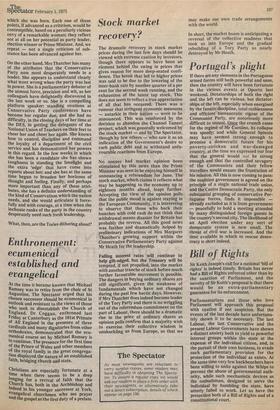Portugal's plight
If there are any elements in the Portuguese armed forces still both powerful and sane, then the country will have been fortunate in the vicious events at Oporto last weekend. Dictatorships of both the right and the left can be vicious, but dictatorships of the left, especially when energised by the fanatic discipline, total ruthlessness and efficient bureaucratic vigour of the Communist Party, are notoriously more difficult to unseat. Once the crunch came for the regime of Mr Caetano, its collapse was speedy; and while General Spinola may have seemed strong enough to promise a democratic future for his poverty-stricken and war-damaged country, at the time we expressed our fear that the general would not be strong enough and that the controlled savagery of the Communists and their fellow travellers would ensure the frustration of his mission. All this is now coming to pass: the coalition government is agreed on the principle of a single national trade union, and the Centre Democratic Party, the only substantial grouping of conservative Portuguese forces, finds it impossible — already excluded as it is from government — peacefully to hold a meeting attended by many distinguished foreign guests in the country's second city. The likelihood of an April election under any sort of democratic system is now small. The threat of civil war is increased. And the time available in which to rescue democracy is short indeed.


































 Previous page
Previous page